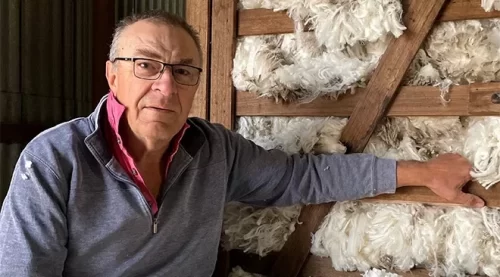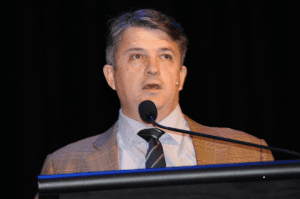
AWI chairman Jock Laurie: it’s possible some brands will walk away from wool.
AUSTRALIAN Wool Innovation stance on mulesing’s importance in wool marketing has been queried after chairman Jock Laurie’s comments in the Australian Superfine Wool Growers Association’s 2023-2024 annual.
In the ASWGA interview, Mr Laurie said when he took the position he “needed to move the heat from the animal welfare conversation,” while claiming “we” (AWI) had positioned AWI to supply market signals to wool growers.”
Mr Laurie said AWI had regular conversations with people from Europe who strongly believe in the need to move to non-mulesed wool production.
Mr Laurie said the Europeans present one side of the non-mulesed wool debate.
“The other side is the 82% of wool sold to China.
“We are getting no indication from the Chinese that they want non-mules,” he said.
“We receive reports every six weeks and, to date, it is consistently reported there is no change in the position.”
Half the wool going to China goes on to other markets

ACWEP president Josh Lamb at the recent KareeWool update.
However, Australian Council of Wool Exporters and Processors president Josh Lamb said although it is correct that 80-85 percent of Australian wool exports go to China, “it’s incorrect that Chinese customers don’t buy non-mulesed (NM) wool, though it’s in the minority.”
Earlier in the article, Mr Laurie said 48pc of the 82pc of wool going to China is consumed in its domestic market.
“He mentioned AWI figures show that 52pc of wool that is imported into China is then re-exported as semi processed or finished product,” Mr Lamb said.
“Where does he think this wool goes?
“Europe and America are the main destinations, textile markets that are also at the forefront of animal welfare and sustainability policy,” the exporter said.
Are non-mulesed wool premiums the answer?
Mr Laurie said AWI does “not disagree with the Europeans, but it is difficult to convince wool growers to go non-mules, especially in more remote areas because of the extra costs involved if there is no premium for many wool types.
The AWI leader said if the Europeans want more non-mulesed wool they should pay a premium.
“Perhaps we need to promote the need for a premium more.”
Mr Lamb said paying more for non-mulesed wool is “not the answer.”
“Maintaining market access is more important.
“Trust me when I say as a wool buyer for over 30 years, we love nothing more than buying a bale,” he said.
“To do that we start with the highest possible price we can pay when inspecting a sample, we then work back from there to find its worth.
“There are no premiums in the auction room, only discounts.”
Would the Australian industry be ready for the banning of mulesing?
In the ASWGA interview, Mr Laurie seems to accept that big clothing brands might walk away from wool over the mulesing issue, while deflecting responsibility for this from AWI.
“Yes, it is possible big brands will just walk away from wool.
“Some of them may already be doing that,” he said in the interview.
“I would like to see farmer groups getting in there to move the matter forward, but I don’t see that leadership at the moment.”
Mr Lamb said no business or organisation should ever accept that customers will walk away from Australian wool.
“Isn’t it a key function of AWI and Woolmark to increase buyers of Australian wool?”
Should non-mulesed wool be a policy or marketing issue for AWI?
In the ASWGA interview, Mr Laurie said non-mulesed wool has been “a difficult issue for AWI.”
He said AWI is a research, development and marketing organisation that collects levies.
“Under the Statutory Funding Agreement (with the Federal Government), it does not deal in policy areas.”
However, Mr Lamb believed non-mulesed wool production required an Australian policy and marketing position.
“No doubt from a marketing point of view the global perception of Australian sheep welfare practice is negative, unfairly in my opinion.
“It does require a policy viewpoint also; that could be as simple as AWI saying it will give mulesing and non-mulesing equal billing,” he said.
“Currently, they only seem to support mulesing, when in the Australian industry we consider mulesing and non-mulesing best welfare practice.”
Mr Lamb said Mr Laurie’s statement on animal welfare in the newsletter was very confusing.
The exporter leader said the two critical risks with mulesing were losing customers of Australian wool and “most importantly, we run the risk every day that a state, federal or overseas government makes a decision to ban mulesing or products produced from it as part of a broader policy.”
“Are we prepared as an industry to deal with that scenario?” Mr Lamb asked.
“Mr Laurie is in a position to show real leadership on various issues that affect all parts of our great industry, but mostly we read him saying in the ASWGA interview what AWI can’t or won’t comment on or do.”

I would think to keep attracting Federal Government funding, AWI would need to encourage growers to stop mulesing. Governments of all persuasion would not like to be seen to be funding cruelty when there has been an alternative for decades — genetic selection. The smoking mirrors must still be guiding AWI from behind the scenes. I haven’t seen any difference in coming elections. And maybe buyers should discount wool that has come from mulesed sheep if they need to push for change.
The AWI board has been hostage to traditional stud breeders for more than a decade. Grower levies have been hostage too. AWI has become irrelevant and is only a cost to growers. They do; however, fund beer and BBQs at shows which is very important.
Remember AWI stopped funding genomics research in 2013 and gave up 50 percent ownership of Sheep Genetics to MLA.
Fortunately, young growers are adopting genomics/breeding values regardless, to meet market demand, increase productivity and reduce costs.
I think Mr Lamb’s comment “paying more for non-mulesed wool is not the answer” goes to show just how out of touch he is with those that grow the fibre that allows him to be in business. It’s time these people got with the times and realised that the world we live in is in a very different situation to what it was when this issue arose 20 odd years ago. We have a world economy on the brink of collapse and a number of conflicts around the world threatening to escalate into a world war where we would undoubtedly be on the opposing side to our biggest customer. I would suggest that we are quickly heading if not already in a situation where 99 percent of the world’s population cares very little whether the garment they are wearing is made from mulesed or non-mulesed wool. They will be flat out trying to make ends meet and put food on the table and hoping like hell the word doesn’t plunge into war. Now perhaps I’m wrong and the economy will rebound and there’ll be peace in the Middle East, but if that’s the case, I’d like to know what’s stopping those that take offence at how we currently manage our sheep from continuing to take offence at other practices that we might continue to undertake if we were to yield to their demands on this issue? You’re a fool if you think tail docking and castration wouldn’t be next on the list.
An important article with far reaching implications for wool growers and the wool industry generally. AWI and its stakeholders must look to the horizon and see what is looming. Little by little consumers are reacting to and rejecting the cruelty entailed in mulesing. Sooner or later it will become a flood, and too late to turn industry practice around on the scale required.
It would help if the industry would clarify what is mulesing and what is not, considering the alternatives. The National Wool Declaration for instance should be less ambiguous about this. A policy issue like this integral to marketing wool promotion can’t be separated as AWI has sought to do for decades, to confuse its stakeholders over all.
The wool industry must get real or the rug (figuratively) will be pulled from under it. It should should not then be surprised.
The coming AWI elections could see an opening on this too.